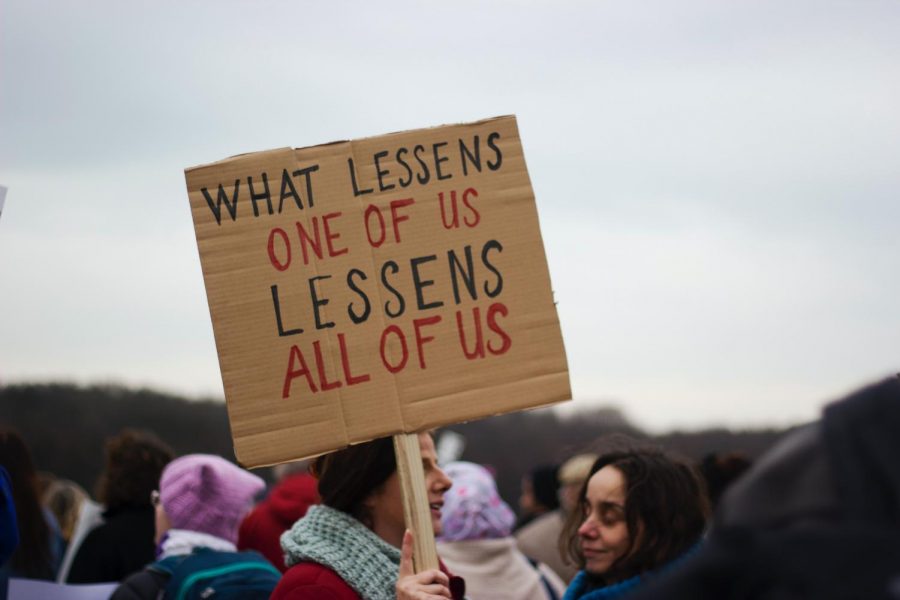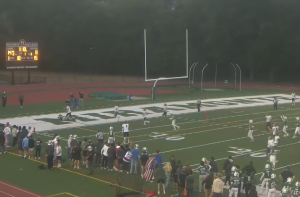NCAA Needs to Prioritize Gender Equality
April 6, 2021
The March Madness college basketball tournaments hosted by the National Collegiate Athletic Association (NCAA) are surrounded by controversy after inequitable treatment between the men’s and women’s teams was revealed. The discrepancy in the quality of the weight rooms provided for the men’s and women’s teams while in the NCAA March Madness tournament bubble reflects a more outstanding equity issue. This recent issue with basketball highlights the long lasting need for the NCAA to prioritize gender equality.
March 18, Ali Kershner, the Stanford University sports performance coach, posted an image to Instagram comparing the men’s and women’s provided weight rooms within the NCAA tournament bubble. The image revealed the men’s weight room with many different sets and varieties of workout equipment, whereas the women’s contained yoga mat and one set of weights.
The post, with almost 150,000 likes, called on the NCAA to address the issue and give the women competing in the tournament equal facilities. Pro WNBA and former Miramonte basketball player Sabrina Ionescu ‘16 and the local Golden State Warriors player Stephen Curry have both Tweeted out about the issue in support of the women’s teams. Not only were their training facilities a source of controversy, but the quality of meals, “swag bags”, and even different types of coronavirus testing also proved to be tailored to suit the men’s needs more than the women’s teams.
“As a female athlete we work really hard to be the best we can be in the sport we love. To do what we love but have it not be viewed in society the same way the men’s game especially is very saddening and disappointing. I’m happy with the notoriety that has been given to the women’s game this year and gender inequality issues in regards to the tournament but there is much more awareness that needs to be given to female athletes overall which we are definitely progressing towards,” Mia Mastrov ‘24, UC Berkeley women’s basketball player and Miramonte graduate said.
It’s clear that the NCAA acknowledges the issue and their lack of equity when they upgraded the women’s weight room just two days after they were initially called out. The NCAA president Mark Emmert told reporters at The Athletic on March 19, “This is not something that should have happened and, should we ever conduct a tournament like this again, will ever happen again.” Admitting their mistake, it’s clear that the women’s teams were a second thought to the men’s. By not providing equal resources, the female athletes were not set up for success in their tournament in the same way the men were.
“I think when it comes to the NCAA it’s way more complicated due to the revenue the NBA makes in contrast to the WNBA, but I was shocked about the lack of equipment and resources the women’s teams were given during this March Madness tournament. I think that that was ridiculous and there was definitely more that could be done for the women’s team,” senior women’s basketball player Julia Miller said.
Many basketball viewers watching the debate unfold will try to discredit the belief that there is an equity issue existing in collegiate basketball by stating the men’s teams bring in more revenue than the womens, justifying their special treatment. While this is true, it is not equitable or fair to “punish” the women by giving them less equipment; the NCAA doesn’t seem to lack money to provide for equal services. According to the NCAA website, the men’s tournament brings in more than $850 million in one year, whereas the women’s only brings in $42 million. However, also on the NCAA website, they state, “Student athletes are at the heart of the NCAA’s mission” and “As a non-profit organization, we put our money where our mission is: equipping student-athletes to succeed on the playing field, in the classroom and throughout life.” The organization donates a large amount of its money to helping student athletes; however, it cannot provide equal resources to athletes competing in the largest college basketball tournament in the country. They hypocritically claim to “equip student-athletes to succeed,” but only hold this true when regarding male athletes. This is clearly not a money issue, but a sexism issue. The NCAA needs to dedicate more resources to creating gender equality in their program and make it a priority.
To ask for adequate resources provided to the men’s and women’s teams only grazes the surface of equity in sports, and does not even include salary and media coverage. Athletic organizations like the NCAA shouldn’t have to be reminded to treat men and women fairly. The NCAA and other organizations should be the ones to spark the conversation on equity in basketball as well as other sports and shouldn’t have to be reminded to do the right thing.








